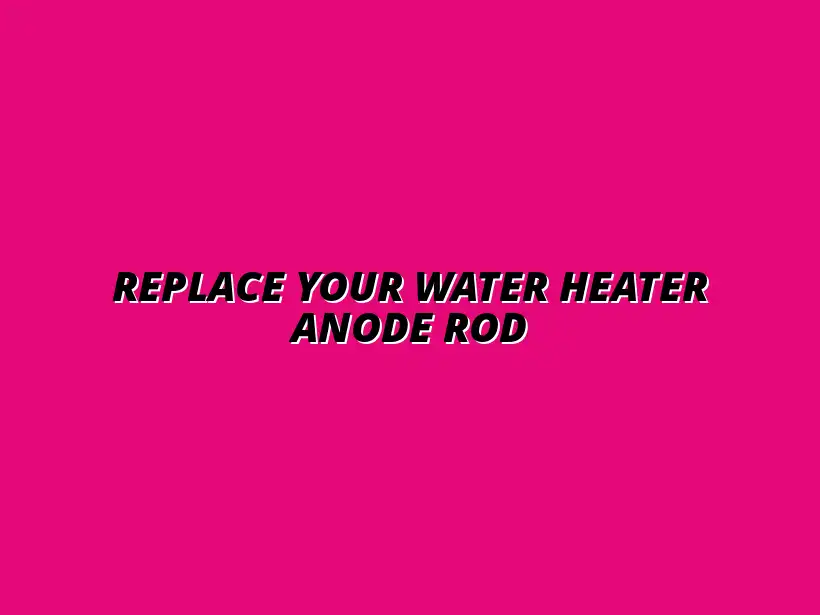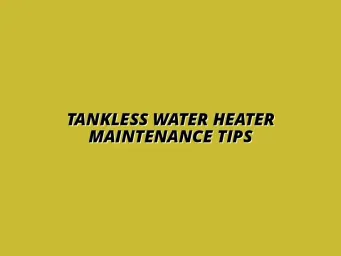
Replace Your Water Heater Anode Rod
Understanding the Importance of Water Heater Anode Rods
Water heater anode rods play a critical role in the lifespan of your water heater. These rods are essentially a protective sacrificial element that helps to prevent corrosion inside the tank. By attracting corrosive elements in the water, anode rods extend the life of the water heater, saving you from costly repairs or replacements. For tips on preventing bathroom plumbing corrosion, check out this helpful guide: prevent bathroom plumbing corrosion tips.
When an anode rod works effectively, it prevents rust from forming inside the tank. This means that, over time, you won’t have to deal with leaks or other issues related to a corroded water heater. Understanding the function of anode rods helps you appreciate why monitoring their condition is so crucial.
Role of Anode Rods in Water Heater Longevity
Anode rods are made from magnesium, aluminum, or zinc, each serving the purpose of sacrificing themselves to protect the tank. When you use hot water, minerals in the water can cause corrosion. However, the anode rod will corrode instead, thereby keeping your tank in good shape. Regular replacement is key to maximizing the lifespan of your water heater, as detailed in this article on regular anode rod replacement benefits.
By regularly checking and replacing your anode rod, you can significantly extend the life of your water heater. In fact, a well-maintained anode rod can add years to your water heater's lifespan. Here’s why they are so important:
- They prevent rust and corrosion inside the tank.
- They save you money on costly repairs.
- They help maintain water quality.
Signs of a Corroded Anode Rod
It’s essential to keep an eye out for signs that your anode rod may be corroded. If you notice any of these indicators, it might be time for a replacement:
- Reddish-brown discoloration in your hot water.
- Strange metallic smells or tastes in your water.
- Unusual noises coming from the water heater.
Ignoring these signs can lead to more significant issues down the line, including leaks and complete tank failure. Learn more about water heater leak causes and fixes to avoid costly repairs. By being proactive and checking your anode rod regularly, you can avoid these potential problems and keep your water heater running smoothly!
Essential Tools and Materials for Replacing a Corroded Anode Rod
When it's time to replace a corroded anode rod, having the right tools and materials on hand is essential. This not only makes the process easier but also ensures that the replacement is done correctly. Here’s a breakdown of what you will need to get started.
List of Tools Required for the Replacement Process
Before you begin, gather the following tools. This will prepare you for a smooth replacement:
- Socket wrench or anode rod socket.
- Pipe wrench (if needed).
- Bucket to catch draining water.
- Garden hose for draining the tank.
Having these tools ready will make your task easier and more efficient. You don’t want to be scrambling for a tool midway through the job! If you're facing a clogged drain, you can find helpful tips on how to unclog your drain without plumbing expertise.
Materials Needed for Anode Rod Replacement
In addition to tools, you’ll need some materials to ensure your new anode rod works efficiently. Here’s what you should have:
- New anode rod (make sure it's the correct size).
- Thread seal tape for securing connections.
- Water-resistant lubricant for the threads.
By having both the right tools and materials, you will set yourself up for a successful anode rod replacement. Remember, preparation is key to a smooth process! Replacing your water heater thermostat is another common maintenance task; check out this guide on how to replace your water heater thermostat.
Final Thoughts on Water Heater Anode Rod Replacement
Replacing a corroded anode rod is more than just a simple task; it’s a vital part of keeping your water heater running smoothly! By understanding the long-term benefits, you can ensure your investment lasts longer and performs better over time. A well-maintained anode rod can significantly delay the onset of rust and corrosion in your water heater tank, which translates to significant savings in both repairs and replacement costs.
Regular maintenance will also enhance the efficiency of your water heater. When the anode rod is functioning properly, it helps prevent sediment buildup, which can lower your heater's efficiency. This means hot water is available when you need it, and you won’t find yourself taking cold showers unexpectedly!
Understanding the Long-Term Benefits of Regular Maintenance
Regular maintenance of your water heater can save you time and money in the long run. Here are some key benefits to keep in mind:
- Increased Lifespan: A well-cared-for water heater can last for over a decade.
- Improved Efficiency: Routine check-ups ensure your water heater operates at peak performance.
- Cost Savings: Preventative maintenance can help you avoid costly repairs down the road.
Another significant benefit is the peace of mind that comes with knowing your water heater is in good condition. Regular inspections can catch minor issues before they turn into major problems, keeping your home safe and your hot water flowing. If you need a plumber in Bournville, Birmingham, consider checking out this resource for local services.
When to Seek Professional Help for Anode Rod Issues
While many homeowners can perform anode rod replacements on their own, there are situations where it’s wise to call in a professional. Here are some signs that you should consider getting help:
- If you're unsure about the condition of your anode rod.
- If you encounter difficulty in removing the old rod.
- If you notice leaks or other problems with your water heater.
Professionals have the experience and tools to handle issues that may arise during the replacement process. For example, if your dishwasher won't drain, you might benefit from a professional's expertise. Here is an article about fixing a dishwasher that won't drain. So if you feel overwhelmed or find unexpected complications, don’t hesitate to reach out for help!
Encouragement to Maintain Your Water Heater's Health
Maintaining your water heater's health is essential for a comfortable home! Regular inspections and routine maintenance tasks can extend the life of your appliance and ensure it runs efficiently. Establishing a good care routine can prevent headaches down the line, keeping your hot water reliable.
Consider setting reminders for yourself to check on your water heater periodically. Being proactive about maintenance not only enhances performance but also helps you stay informed about any potential issues.
Utilizing Resources for Future Water Heater Repairs
There are many resources available to help you with your water heater repairs and maintenance. Here are some that you might find useful:
- Online Tutorials: Websites and videos offer visual guides for DIY repairs.
- Home Improvement Stores: Staff can provide advice and recommendations on materials.
- Plumbing Books: Consider picking up a comprehensive plumbing guide for reference.
Taking advantage of these resources can empower you to tackle maintenance tasks confidently, ensuring your water heater remains in good condition.
Connecting with Plumbing Professionals for Advanced Issues
When it comes to more advanced plumbing issues, connecting with professionals can make all the difference. Here’s how to find the right help:
- Ask for Recommendations: Friends and family can provide referrals to trusted plumbers.
- Read Reviews: Online platforms can help you gauge the quality of local services.
- Request Quotes: Get estimates from multiple professionals to find the best fit for your budget.
By building a relationship with plumbing experts, you can ensure that your water heater—and your entire plumbing system—stays in top shape! Regular check-ups and expert advice will keep your home’s hot water flowing smoothly for years to come.




